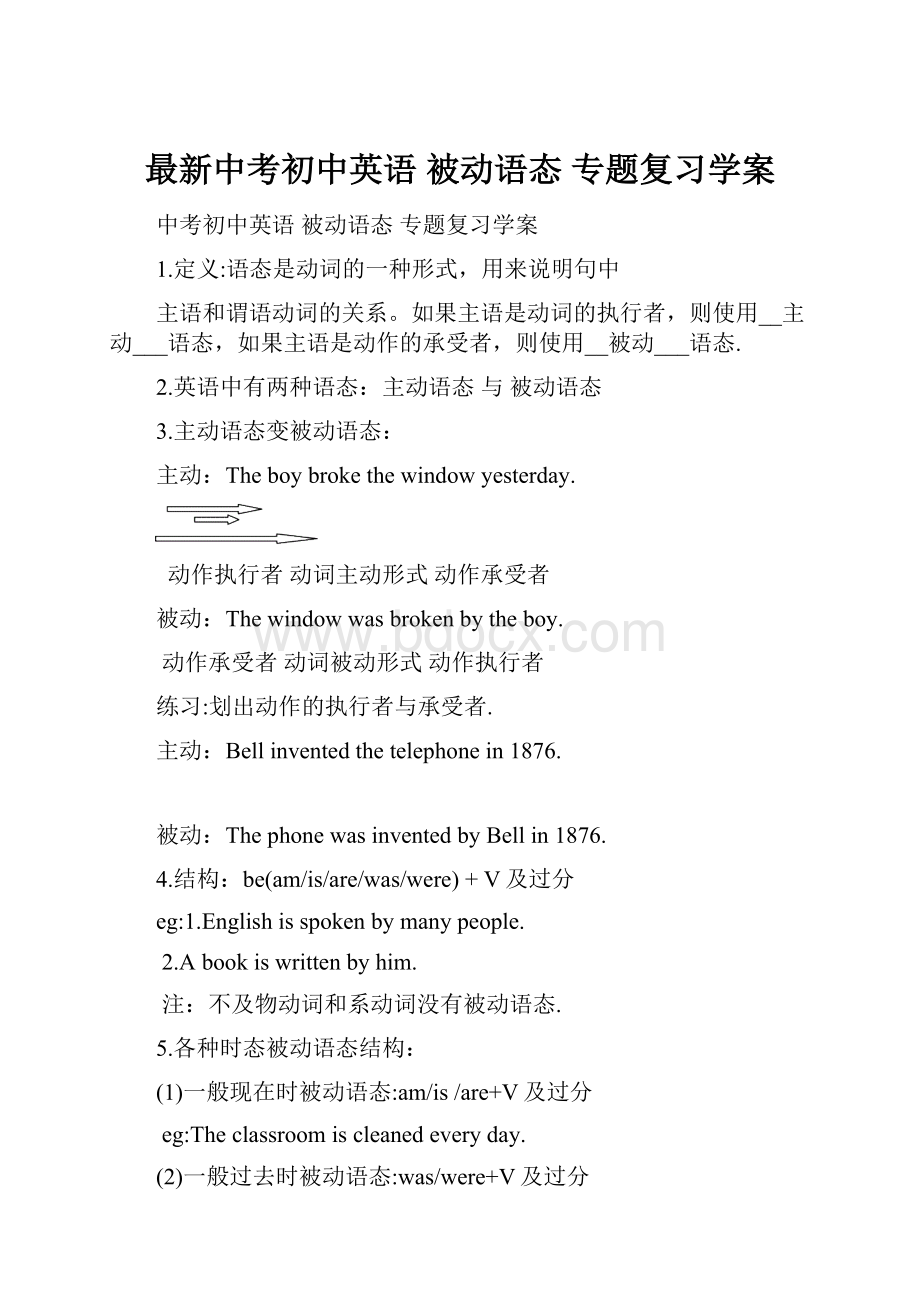 最新中考初中英语 被动语态 专题复习学案.docx
最新中考初中英语 被动语态 专题复习学案.docx
- 文档编号:12232185
- 上传时间:2023-04-17
- 格式:DOCX
- 页数:17
- 大小:47.41KB
最新中考初中英语 被动语态 专题复习学案.docx
《最新中考初中英语 被动语态 专题复习学案.docx》由会员分享,可在线阅读,更多相关《最新中考初中英语 被动语态 专题复习学案.docx(17页珍藏版)》请在冰豆网上搜索。

最新中考初中英语被动语态专题复习学案
中考初中英语被动语态专题复习学案
1.定义:
语态是动词的一种形式,用来说明句中
主语和谓语动词的关系。
如果主语是动词的执行者,则使用__主动___语态,如果主语是动作的承受者,则使用__被动___语态.
2.英语中有两种语态:
主动语态与被动语态
3.主动语态变被动语态:
主动:
Theboybrokethewindowyesterday.
动作执行者动词主动形式动作承受者
被动:
Thewindowwasbrokenbytheboy.
动作承受者动词被动形式动作执行者
练习:
划出动作的执行者与承受者.
主动:
Bellinventedthetelephonein1876.
被动:
ThephonewasinventedbyBellin1876.
4.结构:
be(am/is/are/was/were)+V及过分
eg:
1.Englishisspokenbymanypeople.
2.Abookiswrittenbyhim.
注:
不及物动词和系动词没有被动语态.
5.各种时态被动语态结构:
(1)一般现在时被动语态:
am/is/are+V及过分
eg:
Theclassroomiscleanedeveryday.
(2)一般过去时被动语态:
was/were+V及过分
eg:
Thebikewasboughtyesterday.
(3)含有情态动词的被动语态:
情态动词(can/may/must/should/need)+be+V及过分
eg:
1.Itcanbedoneinonehour.
2.Treesmustbeplantedeveryyear.
(4)一般将来时被动:
will/shallbe+V及过分
eg:
Themeetingwillbeheldtomorrow.
(5)现在进行时被动:
am/is/are+being+V及过分eg:
AnEnglishtalkisbeinggivenbyMr
Wang.
(6)现在完成时被动:
have/has+been+V及过分eg:
Manybuildingshavebeenbuiltinour
city.
(7)过去完成时被动:
hadbeen+V及过分
eg:
Lotsoftreeshadbeenplantedinthepastfewyears.
6.被动语态的基本用法:
1.强调或突出动作的执行者时用by+执行者.
eg:
Chineseisspokenbythelargestnumberofpeopleintheworld.
2.没必要或无法说出动作的执行者.
eg:
1.CarsaremadeinShanghai.
2.Sweatersareusedforkeepingwarm
注:
1.汉语中的“被,受,由”等词在翻译英语时常用被动语态
2.含有hear/make/see的句子变为被动时,需要加to.
eg:
1.Ioftenhearhersinginthenextroom.
She_______often_____________sing
inthenextroom.
2.Thebossmadehisbrotherwork18
hoursaday.
Hisbrother_________________work18hoursaday.
3.用于词组的被动语态,常用于表示"据说"或"相信",
eg:
Itissaidthat...(据说...)
Itisreportedthat…(据报道...)
Itiswell-knownthat…(众所周知)
4.有些动词用主动表被动:
write/sell/clean/wash/want(need)+doing/
want(need)+tobedone/beworthdoing
eg:
(1)这种食物尝起来好卖的也好.
Thisfoodtastes_____and_____well.
(2)这支笔写的很糟/流畅.
Thispen________badly/smoothly.
即学即练:
1.用括号中动词被动结构的适当形式填空.
1.English________widely___________(use)
intheworld.
2.She______(fall)illlastnight,andshe
___________(take)tothehospitalatonce.
3.TheGreatWall____________________(know)
allovertheworld.
4.Threechildren_______________(take)good
careofbythenurse.
5.Somenewhouses_________________(build)
bythevillagersthemselves.
6.Whatlanguage__________________(speak)
inJapan?
7.Theblackbike_____________________(buy)
inthatshopthreedaysago.
8.Thebigtree_____________________(blow)
downinthestormlastnight.
9.Computerscience_____________(teach)now
almostinalluniversities.
10.Thefirstrailwayintheworld__________
(design)inthelastcentury.
11.Thewindow_________________(notbreak)
bytheboyjustnow.
12.Visitors_____________________(ask)not
totouchtheexhibits(展览品).
13.Abeautifulhorse___________________
(draw)byJohnyesterday.
14.Thepictures________________(take)by
Jacktomorrow.
15.Schoolfootballgame__________________(hold)lastFridayevening.
16.Anumberofthetrees________________
(plant)aroundDalianeveryyear.
17.Thisbook________________(write)forChinesechildrenatthattime.
18.He______________(invite)tothepartybyhisfriendslastMonday.
19.Thesportsmeeting__________________(hold)nextFriday.
二.单项选择.
1._____anewlibrary_____inourschoollastyear?
A.Is;builtB.Was;builtC.Does;buildD.Were,built
2.Anaccident____onthisroadlastweek.
A.washappenedB.ishappenedC.happenedD.washappening
3.Cotton______inthesoutheastofChina.
A.isgrownB.aregrownC.growsD.grow
4.AtalkonChinesehistory_____intheschoolhallnextweek.
A.isgivenB.hasbeengiven
C.willbegivenD.willgiven
5.Yourshoes____.Youneedanewpair.
A.wearoutB.wornout
C.arewornoutD.wearsout
6.Itisreportedthatmoreteaching
buildings_____________inourschoolnextterm.
A.willbebuiltB.willbuildC.wasbuiltD.built
7.Mary_______showmehernewdictionaryjustnow.
A.hasaskedtoB.wasaskedtoC.isaskedD.asked
8.Themonkeywasseen_____offthetree.
A.jumpB.jumped
C.tojumpD.jumping
9.He_____________somepiecesofadvice,buthe__________tothem.
A.gave,didn’tlisten
B.wasgiven,wasn’tlistened
C.wasgiven,didn’tlisten
D.gives,doesn’tlisten
10.Astrangething______inourschool
yesterday.
A.washappened
B.hasbeenhappened
C.happened
D.happens
11.Jimwasn’tatschoolbecausehe_________tostayathome.
A.istoldB.told
C.wastoldD.willbetold
12.Theteachertoldhisstudentsthatthey_____tobeusefulmentothecountry.
A.wereallexpected
B.wereallexpecting
C.allwereexpected
D.expected
13.___________thatSusancan’tgotothe
partybecauseshe_______________.
A.It’ssaid,didn’tinvite
B.It’ssaid,wasn’tinvited
C.Iwastold,wasn’tinvited
D.It’ssaid,doesn’tinvite
一、英语阅读理解专项练习试卷
1.阅读理解
Awealthymanaskedanoldscholartotellhissonawayfromhisbadhabits.Thescholartooktheyoungmanforawalkthroughagarden.Stoppingsuddenly,hetoldtheboytopulloutatinyplantgrowingthere.
Theyoungmanmadeiteasily.Theoldmanthenaskedhimtopulloutalittlebiggerplant.Theyoungmanpulledhardandtheplantcameoutwithitsroots.“Nowpulloutthatone,”saidtheoldman,pointingtoalittletree.Theboyhadtouseallhisstrengthtopullitout.
“Nowtakethisoneout,”saidtheoldman,pointingatabigorangetree.Theyoungmanheldthetrunk(树干)andtriedtopullitout.Butitwouldnotmove.“It'simpossible”,saidtheboy,panting(喘息)withtheeffort.
“Soitiswithbadhabits,”saidtheoldman.“Whentheyareyoung,itiseasytopullthemout.Butwhentheygodeeply,theycannotbeuprooted.”
Theconversationwiththeoldmanchangedtheboy'slife.
(1)Thescholaraskedtheyoungmantotakeawalkwithhiminthe__________.
A. forest B. park C. garden D. school
(2)Thescholaraskedtheyoungmantopulloutplantsfor_____times.
A. four B. two C. three D. five
(3)Accordingtothepassage,thescholarmustbe__________.
A. astupidman B. alazyman C. awiseman D. afunnyman
(4)Thispassagemainlytalksabout___________.
A. weneedexercisemoretopulltreesout
B. howtogetawayfrombadhabits
C. talkingwithascholarisveryimportant
D. theearliergettingawayfrombadhabits,thebetter
【答案】
(1)C
(2)A
(3)C
(4)D
【解析】【分析】短文大意:
一个富人请求一位智者去除儿子的坏习惯。
智者把这个孩子带到了公园,要求这个年轻人先后四次拔出植物,由易到难,去除坏习惯也是如此,当它们还不明显的时候,去除它们很容易,但是当它们深深扎根的时候,就难以去除了。
智者的这堂特殊的课改掉了孩子的坏习惯,改变了男孩的一生。
(1)C细节理解题。
根据短文第一段中的句子“Thescholartooktheyoungmanforawalkthroughagarden.”可知,智者让青年人在花园里与他一起散步,故答案为C。
(2)A细节理解题。
根据短文中出现的句子topulloutatinyplant,topulloutalittlebiggerplant.Nowpulloutthatone,saidtheoldman,pointingtoalittletree.“Nowtakethisoneout,”saidtheoldman,pointingatabigorangetree.可知,智者要求这个年轻人先后四次拔出植物。
故答案为A。
(3)C推理判断题。
智者要求这个年轻人先后四次拔出植物,由易到难,去除坏习惯也是如此,当它们还不明显的时候,去除它们很容易,但是当它们深深扎根的时候,就难以去除了。
智者的这堂特殊的课改掉了孩子的坏习惯,改变了男孩的一生,足以说明智者的聪明之处,故答案选C。
(4)D主旨大意题。
根据短文倒数第二段智者的话:
“Soitiswithbadhabits,”saidtheoldman.“Whentheyareyoung,itiseasytopullthemout.Butwhentheygodeeply,theycannotbeuprooted.”可知,坏习惯要及早的去除,越早远离坏习惯,越好。
故答案为D。
【点评】主旨大意题(主题、标题)在阅读理解中经常会出现。
第四小题适合用捕捉主旨大意来解题。
所谓主旨大意,也就是文章的中心思想,主题思想,中心观点,它常常针对文章的主题,作者的写作意图,文章段落的中心思想进行提问,这类题也叫归纳概括题。
文中智者用拔植物的难易来类比坏习惯的去除也是如此。
当它们还不明显的时候,去除它们很容易,但是当它们深深扎根的时候,就难以去除了。
也就是说越早远离坏习惯越好。
答案为D。
2.阅读理解
Itwasafullmoonnight.Athiefwasgettingreadytostealsomethingfromavillager'shouse.Hegottothehouse,andthenwentinsidequietly.Bythemoonlightoutside,heenteredadarkroom.Hecouldnotevenseehisownhandsorfeet.Butonthewallneartheroof,therewasaventilator(通风设备).Themooncreatedacircleoflightonit.Thethiefbroughtaclothwithhiminordertogettogetherallthethingshehopedtosteal.Hespreaditoutonthefloorandwentinsidethestoreroom,whereallthethingswerekept.
Hedidn'tknowthattheownerofthehousewasawakeandwatching.Assoonasthethiefwentinsidethestoreroom,hegotupquicklyfromhisbed,andpickeduptheclothwhichthethiefhadspreadout.Hecamebacktohisbed,whichwasinonedarkcorneroftheroom,andwaitedforthethieftocomeout.
Atthesametime,thethiefwentoncollectingthethingshewantedandthrewthemonthefloorwhereheknewhehadspreadoutthecloth.Soontherewasalittlemountaininthecenteroftheroom.Thenthethieflookedaroundfortheendoftheclothtotieupthestolenthings.Atthattime,thehouseownerletoutabiggroan--adeepgroan.Thethiefwassoscaredthathehurriedtorunaway.Thethiefnotonlyfailedtosteal.Butalsolosthiscloth.
(1)Fromthepassagewecanlearnthatthethiefwastostealsomethingfromavillager'shouse .
A. intheafternoon
B. inthemorning
C. atnight
D. atnoon
(2)Theunderlinedword“groan”means“ ”.
A. .呼吸
B. 呻吟般的声音
C. 休息
D. 铃声
(3)Whatofthefollowingstatementsisnottrueaccordingtothepassage?
A. Thethiefspreadtheclothoutonthefloorandwentinside.
B. Thethiefwassoscaredafterthehouseownerletoutabiggroan.
C. Theownerofthehouseasleep.
D. Thethiefnotonlyfailedtosteal,butalsolosthiscloth.
【答案】
(1)C
(2)B
(3)C
【解析】【分析】文章讲述了一个小偷半夜溜进一家房子,准备偷东西后来主人醒了,小偷被吓跑,什么也没偷到的故事。
(1)细节推理题。
根据“ Itwasafullmoon
- 配套讲稿:
如PPT文件的首页显示word图标,表示该PPT已包含配套word讲稿。双击word图标可打开word文档。
- 特殊限制:
部分文档作品中含有的国旗、国徽等图片,仅作为作品整体效果示例展示,禁止商用。设计者仅对作品中独创性部分享有著作权。
- 关 键 词:
- 最新中考初中英语 被动语态 专题复习学案 最新 中考 初中英语 被动 语态 专题 复习
 冰豆网所有资源均是用户自行上传分享,仅供网友学习交流,未经上传用户书面授权,请勿作他用。
冰豆网所有资源均是用户自行上传分享,仅供网友学习交流,未经上传用户书面授权,请勿作他用。


 《雷雨》中的蘩漪人物形象分析 1.docx
《雷雨》中的蘩漪人物形象分析 1.docx
